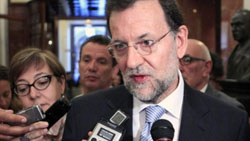
Amid tax increases and public spending cuts union leaders in Spain have told King Juan Carlos that they are opposed to an international bailout and that the austerity measures introduced by Mariano Rajoy’s government are “suicidal” for the country.
Prime minister Rajoy admitted last week that Spain may have to request further assistance from the ECB but that it would depend on the conditions. Spain has already requested 100 billion euros to prop up the banking sector which is drowning under billions in bad property loans.
Following an hour-long meeting with the monarch on Tuesday, a statement issued by the General Workers Union and the Workers Commission said they are generally opposed to any further financial aid as the conditions would likely push the country further into recession and increase pressure on already struggling Spaniards who are suffering from two years of spending cuts and tax increases as the government attempts to reduce it’s budget deficit.
The statement also said that the public spending cuts and labor reforms already enacted were “suicidal for our country (and) were putting a brake on possible economic recovery and job creation.”
Since Rajoy’s remarks last Friday, pressure on Spain has eased slightly and the 10-year bond yield was at 6.7% on Tuesday.
King Juan Carlos has been in the news himself recently following his expulsion from the World Wildlife Fund last month. He had held the position of Honorary President for 30 years but was voted out after photographs of his hunting trip to Botswana showed the monarch posing, with a shotgun, next to a dead elephant.
No official comment has been made by the royal palace following the meeting.





